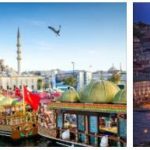Airplane: Domestic airlines connect about 30 cities in the country. Many flights, including from Dalaman to Van, go via the transport hubs of Istanbul or Ankara. Atlasjet is one of the few airlines thath ave direct flights between the west coast and the cities in the center and on the east coast of the country. Most flights can be booked on the airline’s website.
According to Paradisdachat, airlines that offer flights within Turkey include Atlasjet, Fly Air, Onur Air, Pegasus Airlines, Sun Express Airlines and Turkish Airlines.
Ship: Istanbul Fast Ferries operates a network of car ferries on the Sea of Marmara. There are among other things links from Istanbul to Yalova, Bandirma and Mudanya.
Rail: the services of the Turkish State Railways (Türkiye Cumhuriyeti Devlet Demiryollar ?, TCDD) cover the entire country. While the older routes do not take the shortest route to their destination and long travel times are the order of the day, the newly created route sections, used by express trains, are designed to bring travelers from one place to another within a short period of time. The Istanbul-Ankara connection is one of these high-speed lines. A number of others are being planned.
Although the rail network in the center and in the east of the country is well developed, there are hardly any connections along the coastline. The route between Izmir and Selçuk is an exception. If you want to tour the Aegean and Mediterranean coasts, you can take the train to Izmir or Konya and continue the journey from there by bus.
Popular rail routes run from Istanbul to Ankara, from Istanbul to Konya and Tehran (Iran) – both night trains – and from Istanbul to Aleppo (Syria). Rail travelers should note that the stations and not the cities are often shown on the timetables. For example, instead of Izmir, the city’s two main train stations – Basmane and Alsncak – could be indicated.
Train tickets usually only cost half of the corresponding bus tickets. Children, students, senior citizens and the disabled receive a 20 percent discount. Inter-Rail, Balkan Flexipass Eurodomino and passes are valid on the Turkish rail network; Eurail passes do not.
Car: those who travel to Turkey by car can enjoy wonderful landscapes and beautiful coastlines, enjoy local specialties offered on the roadsides and also explore the most remote places. The main roads are well developed and signposted. The driving conditions along the popular routes on the Aegean and Mediterranean coasts are excellent.
However, drivers should be able to come to terms with the impatient and rapid driving style of the locals and not allow themselves to be provoked. When driving at night, due to the condition of some roads, crossing animals and cars without lights, great care is required. It should be avoided if possible.
Rental car
If you only want to travel a small part of the country by car, you can easily fall back on rental cars. To rent a car in Turkey, drivers must be at least 21 years old and have one year of driving experience. If you don’t have a credit card, you have to expect a deposit of several hundred euros. The largest agencies with offices in Turkey include Avis, Europcar, Decar, Car Rental Istanbul, Green Car and Turkey Car Hire Express.
In the event of an accident, the vehicle should never be moved before the police arrive. It is important to ask for an accident report (Kaza Raporu). The rental car agency must be notified within 48 hours.
Insurance
Anyone traveling to Turkey by car needs liability insurance that applies to the whole country – not just Thrace or the European part. There are two types of insurance cover for rental cars – against damage to the vehicle (CDW) and against theft (TP). Accident insurance for rental cars is optional.
Buses are a widespread, popular, and excellent mode of transport in Turkey. The buses are well maintained and comfortable. Most Turkish cities and towns usually have a central bus station, otogar, garaj or terminal. The train station is also the point of contact for intercity buses and for the minibuses that function as shared taxis, which connect the individual districts and villages with one another. Luggage storage (Emanetçi) is available at most bus stops. Bus companies with an extensive route network are Boss Turzm, Kamil Koç, Ulusoy and Varan. Fares vary depending on the bus company and route.
Local transport: Tickets for city buses are available in special sales points, for example at bus stations or bus stops. The Tickest must be purchased prior to departure. In some cities, such as Istanbul, buses run by private companies run on the same routes as the state buses. The privately operated buses are mostly somewhat older models. Some cities have trams that are a quick and efficient way to get around the city.
Taxi: in addition to the shared taxis that operate along the state bus routes, there are also metered taxis.
Bicycle: Cyclists can experience a lot on a trip through Turkey. The highlights are the spectacular landscape, numerous archaeological sites and the hospitality of the locals, especially in the east of the country.
Because of the heavy traffic, cyclists should avoid the main roads if possible. Recommended bicycle tours through Turkey are shown on the map Köy Köy Türkiye Atlasi Yol, which is available in bookshops.
There are excellent bike shops in Istanbul and Ankara that have high-quality spare parts in their range. As a rule, bicycles can be taken on planes, buses, trains or ferries at no additional cost. In tourist resorts along the coast and in Cappadocia, bicycles can often be rented for short periods.








